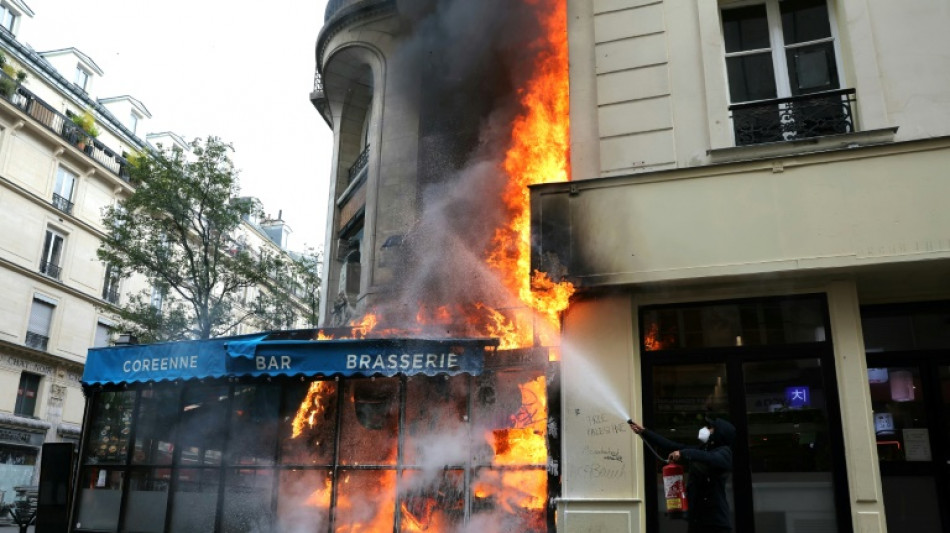
RBGPF
0.1000


France's new Prime Minister Sebastien Lecornu promised a "profound break" with the past on Wednesday as he faced the thorny task of trying to build a government with enough parliamentary support to pull the country out of a political crisis.
Lecornu's first day on the job coincided with street protests across France in a show of grassroots opposition to President Emmanuel Macron, which resulted in clashes with police and dozens of arrests, as well as a fire that broke out at a restaurant in central Paris.
But the protests, called by a collective without a clear leader, had an uneven impact across the country.
The president appointed Lecornu -- a close Macron ally and defence minister for the past three years -- late on Tuesday, only 24 hours after his predecessor Francois Bayrou lost a confidence vote in parliament over his attempt to implement austerity measures to reduce France's debt.
Taking over from 74-year-old Bayrou, Lecornu, who is 39, promised to find "more creative" ways than before to work with opposition parties to try to build a stable government.
"We will get there," he said during a handover ceremony.
Lecornu is the seventh prime minister since Macron took office in 2017 -- and the third within the space of a year.
He faces the urgent challenge of giving France a budget for 2026 without suffering the same fate as Bayrou, who lasted just nine months and fell when opposition parties joined forces to push him out.
- 'Break or censure' -
Lecornu said he would address the nation "in the coming days" to explain his approach, which he insisted would be different from the past, and "not just in method".
Since Macron dissolved parliament last year, successive governments have lacked a majority in the National Assembly, putting them in constant danger of being voted out.
The hard-left France Unbowed (LFI) party has already announced a no-confidence motion against Lecornu in parliament, for now with no backing from other parties.
The far-right National Rally (RN) party, which senses its best ever chance to come to power and has urged Macron to call snap elections, indicated it does not want to unseat Lecornu immediately.
But RN party leader Jordan Bardella warned that the far right expected Lecornu to turn away from the policies of his predecessors.
"Either there will be a break, or there will be censure," said Bardella, 29.
Authorities deployed tens of thousands of police nationwide to face the demonstrators.
Some 175,000 protesters participated in the movement as of late afternoon, according to interior ministry figures.
Demonstrators in and around Paris built barricades from rubbish bins, blocked schools and roads and pelted police with garbage early in the day.
A restaurant caught fire in the French capital, which prosecutors said could have been caused involuntarily by police intervention.
Interior Minister Bruno Retailleau warned demonstrators that there would be "zero tolerance" for violence, praising police and criticising protesters.
"On one side, the France of courage -- the men and women in blue," he said, referring to police. "On the other, the France of sabotage in black."
Despite a call by a loose left-wing coalition of organisers to "block everything", that target appeared to be only partly achieved.
Most high-speed trains ran on schedule, and disruption to the Paris metro was minimal, operators reported.
But many schools were blocked, and protesters occupied roads and railway stations across the country.
In Lyon, demonstrators blocked a road running through the southeastern city and set bins on fire, while in the western city of Nantes the police used tear gas to disperse protesters.
Nearly 500 people were arrested nationwide by 5:45 pm (1545 GMT) Wednesday.
Macron's decision to name a close ally as prime minister was a "slap in the face", said Florent, a protester in Lyon who gave only his first name.
"We need change," he said.
- 'Facebook revolutionaries' -
The decentralised nature of the protests was reminiscent of a previous anti-government movement -- the Yellow Vests, which emerged in 2018 without clear leadership and became a major test for Macron during his first term.
Paris police chief Laurent Nunez said he suspected the "radical left" was running the protests.
Cedric Brun, a 46-year-old auto worker and local union boss in the northern city of Valenciennes, said he was disappointed to see protesters easily kept at bay by police.
Bayrou had insisted 44 billion euros ($52 billion) of spending cuts were needed to tackle France's debt and stabilise the public finances.
Opponents accused him of trying to achieve this at the expense of wage earners and pensioners while sparing the wealthy.
"Without measures to boost purchasing power, without taxing the very wealthy, the same causes are likely to produce the same effects, namely censure," Boris Vallaud, the head of Socialist lawmakers, told broadcaster RTL.
I.Taylor--ThChM--ThChM